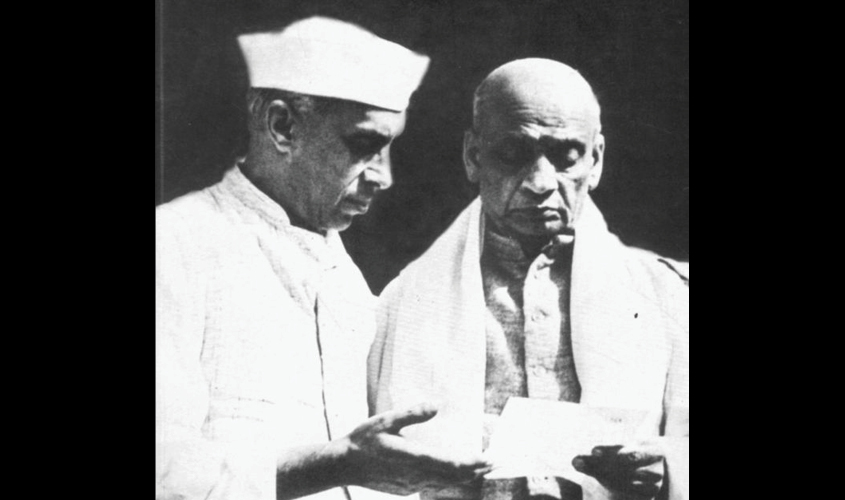Saifuddin Soz falters on fact; hypes Hurriyat sentiment.
The launch of Saifuddin Soz’s Kashmir: Glimpses of History, the Story of Struggle was mired in controversy due to his pre-launch remarks which invited the ire of BJP chief Amit Shah. The diatribe from Shah made Soz’s party, Congress, disown him and an unobtrusive diktat made P. Chidambaram, who was billed as the star attraction of the book release, stay away. The author was hopeful that Dr Manmohan Singh, in whose Cabinet he had served, would turn up as SPG had made reconnaissance of the venue. But the former Prime Minister too gave the function a miss. Riot police was posted outside the venue, while inside, two panellists on the podium questioned the author’s approach.
Amit Shah had torn into the book and attacked Congress’ approach on the Kashmir question due to Soz’s endorsement of Pervez Musharraf’s statement that Kashmiris wanted “azadi” and not merger with Pakistan. Soz’s views on Sardar Patel also invited flak. At the release function Soz said the views expressed had nothing to do with Congress as a party. “It is my book. I have narrated facts”, he said hysterically.
Former Jammu & Kashmir cadre bureaucrat, Wajahat Habibullah, the first panellist to speak, questioned Soz’s facts. He said that while in a meeting with Pakistan Governor General Liaqat Ali Khan prior to the Pakistani-sponsored incursion into the valley in September 1947 Sardar Patel had asked Pakistan to lay its hands-off Hyderabad-Deccan (as that area had no contiguity to the new state), he was not a hardliner on Kashmir. However, after the skirmishes broke out Patel was firmly of the view that the accession was final and that there was no question of a plebiscite. Habibullah’s assertion is borne out by V.P. Menon’s The Story of Integration of Indian States and Lord Bradwood’s Two Nations and Kashmir.
Jawaharlal Nehru’s genealogical link with Kashmir and his deep friendship with Sheikh Mohammed Abdullah had cast its shadow on India’s Kashmir policy, including the inclusion of Article 370 as a “temporary and transient” provision in the Constitution. The principal draftsman, B.R. Ambedkar, was not only opposed to the Article, but refused to draft it or be associated with its passage, which took place on a day when Nehru was abroad. Patel, who did not want to rock the boat by highlighting his differences with Nehru, dutifully carried out the task assigned by the Prime Minister of the interim government and ensured that it was not made a permanent feature. Soz’s stand that Patel wanted to give Kashmir to Pakistan, therefore, does not stand the litmus test.
Another count on which Habibullah questioned Soz was the author’s claim that Aurangzeb was the last Mughal ruler to visit the valley. Habibullah pointed out that Farrukhsiyar, who ruled from the Red Fort after two of Aurangzeb’s successors, had visited Kashmir and invited Raj Kaul, Jawaharlal Nehru’s ancestor, to join the court in Delhi in the year 1716. (Farrukhsiyar, who ruled between 1713 and 1719, had issued the firman in 1717 which paved the way for East India Company to consolidate its base in Bengal which ultimately led to the British victory in 1757 at Plassey. Farrukhsiyar perhaps unwittingly laid the foundation of British rule and the post-British Nehru rule. )
Another panellist, Arun Shourie commented that “history is a heavy package in a conflict situation”. He wished that the author would list out solutions to the present disquiet without harking to the past. Shourie felt that in Kashmir and in the Northeast, New Delhi has relied on “subcontractors” and tried to stay away from directly addressing the problem. He referred to both National Conference and the PDP in the category of the “subcontractors”. He hinted the huge amounts sanctioned for the people of Kashmir by the Centre never reach the people. The inability of the CAG of India to audit the state due to Article 370 comes in the way of transparency. Apart from the elections held during the regimes of Morarji Desai (1977) and Atal BehariVajpayee (2002) polls were rigged in Jammu & Kashmir and this has generated angst. Shourie felt that people of Kashmir should “stop playing victim” and try to find peace.
Soz, who had organised meetings between Manmohan Singh and the Hurriyat in 2006 (when he was in the Cabinet) is of the opinion that Hurriyat has been the “representative of fury”. This stand is contrary to the Congress stand that Hurriyat leaders are “unelectable” and “unrepresentative”. Soz feels that there are three stakeholders in Kashmir: India, Pakistan and the people of the valley (read: Hurriyat). This is contrary to the spirit of the 1972 Shimla Agreement, which makes Kashmir a “bilateral” issue. The recent suggestion by the Chinese envoy in New Delhi for a “trilateral” between India, Pakistan and China was dismissed by the regime in Beijing as it upheld the bilateral status. Soz, therefore, seems to be out of depth.
After a career in teaching, including a stint in J&K’s Board of Secondary Education, Soz joined politics post Sheikh Abdullah in 1983. Farooq Abdullah sent him to Lok Sabha and to the Rajya Sabha and even made him the National Conference face in the H.D. Deve Gowda and I.K. Gujaral Cabinets. Soz defied NC whip and his vote on 17 April 1999 made Atal Behari Vajpayee lose the confidence motion 269-270. Later Soz joined Congress, was made a minister and later PCC president.
His views coming at a time when the number of mourners for terrorists is dwindling and when people are turning up in large numbers to mourn the sons of J&K who are martyred while serving the Indian Army and the J&p Police, are not in sync with the mood in the valley.

